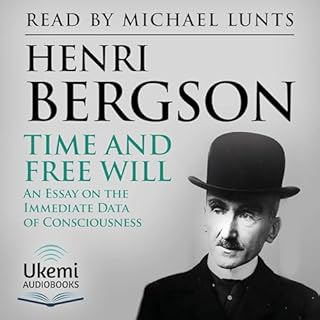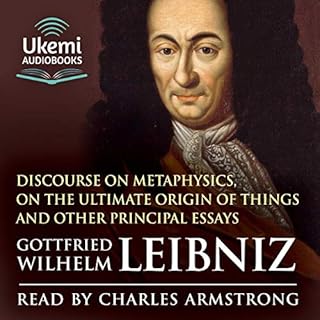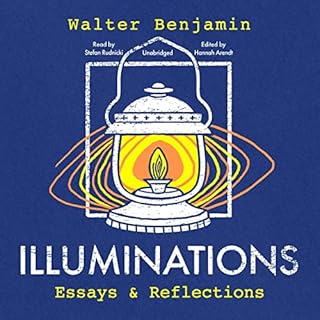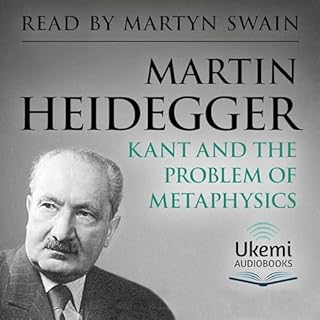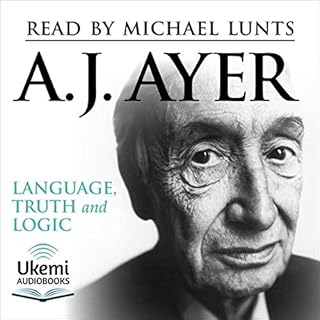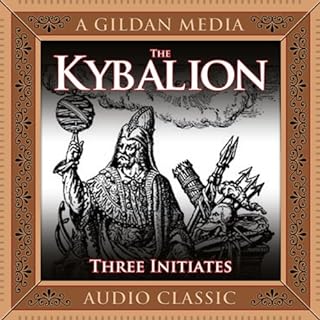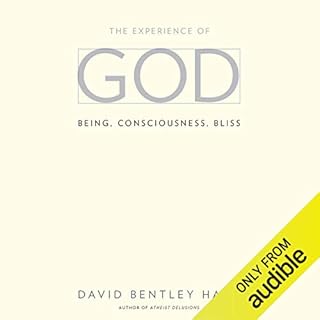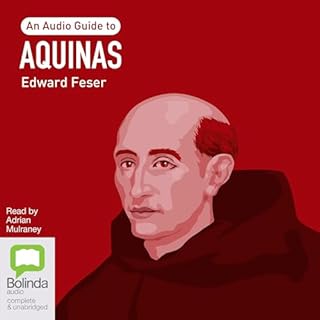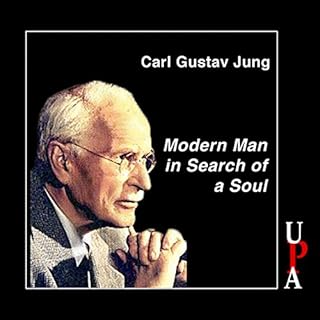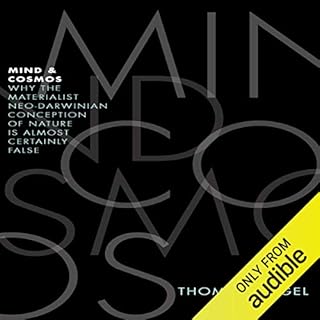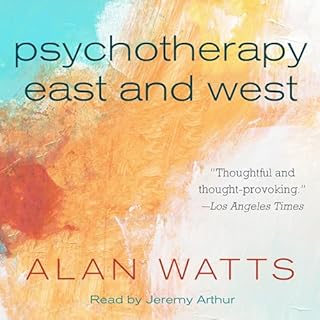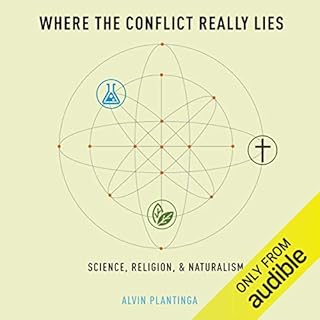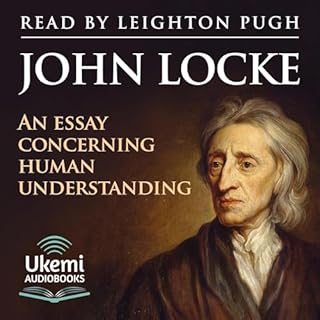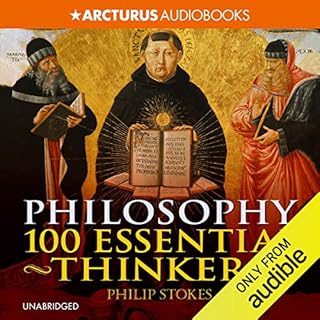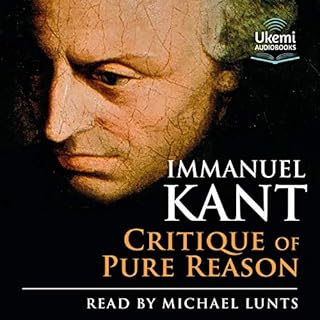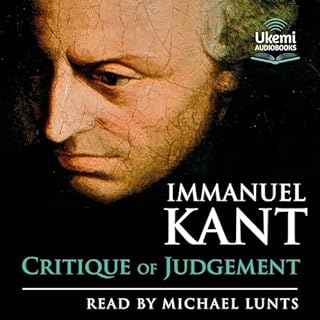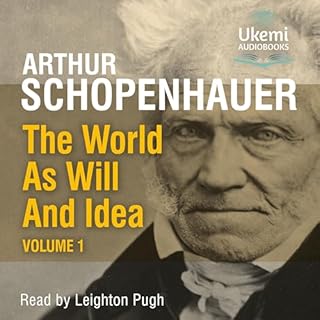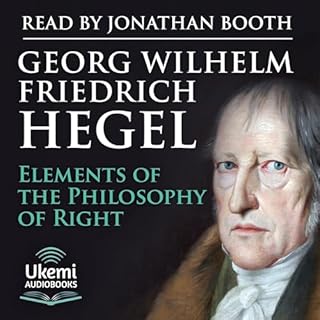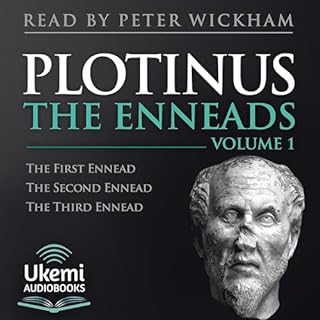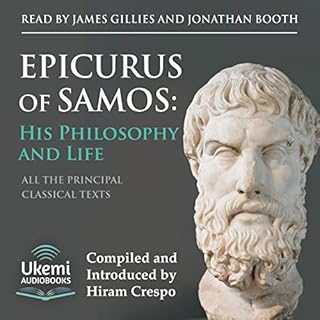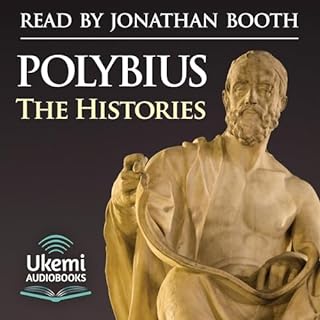
Matter and Memory
Failed to add items
Add to Cart failed.
Add to Wish List failed.
Remove from wishlist failed.
Adding to library failed
Follow podcast failed
Unfollow podcast failed
 Prime members: New to Audible?
Prime members: New to Audible?Get 2 free audiobooks during trial.
Buy for $17.40
No default payment method selected.
We are sorry. We are not allowed to sell this product with the selected payment method
-
Narrated by:
-
Michael Lunts
-
By:
-
Henri Bergson
About this listen
Matter and Memory, (Matière et Mémoire), published in 1896, was the second book written by Henri Bergson (1859-1941), one of the leading French philosophers of his age. It followed Time and Free Will (1889) and helped to establish him as a major force in anti-mechanistic thought, opposing the trend towards uncompromisingly secular and scientific views. However, when Matter and Memory appeared, Bergson was 39 and had yet to become the hugely influential figure he became in the first decades of the 20th century.
The first edition carried the subtitle An Essay on the Relationship of Body to Spirit and although this was dropped by the author when revising the text in later editions, it remains a useful introductory statement. For in Matter and Memory, Bergson set out to consider the classic problem of the union of ‘soul and body’ by the analysis of memory. He sought to refute the proposition, then very current, that memory, being ‘lodged’ in the nervous system, localised in the brain, was therefore material. Bergson rejected this reduction of mind to matter.
He considered memory to be deeply spiritual. The first edition explained his approach thus: ‘The brain merely guides memory towards actions in the present. The brain inserts memories into the present, with a view to action. The brain has a practical function. The body is the centre of action. Cerebral lesions do not damage memories or the memory. Such lesions disrupt the practical operations of the brain. Memories cannot become incarnate. They always exist, but they are powerless. In fact, the brain no longer functions as intended, and consequently these memories cannot be used.’
In his introduction to the fifth edition of Matter and Memory (1908), used in this recording, Bergson writes, ‘This book affirms the reality of spirit and the reality of matter, and tries to determine the relation of the one to the other by the study of a definite example, that of memory. It is, then, frankly dualistic. But, on the other hand, it deals with body and mind in such a way as, we hope, to lessen greatly, if not to overcome, the theoretical difficulties which have always beset dualism, and which cause it, though suggested by the immediate verdict of consciousness and adopted by common sense, to be held in small honour among philosophers.’
Though the next generation of French philosophers such as Merleau-Ponty and Sartre acknowledged the influence of Bergson, his reputation declined after World War II. It was revived in the mid-1960s following the championing of his work by Gilles Deleuze. Bergson’s place in 20th century philosophy, and the relevance of his views today, are secure.
PLEASE NOTE: When you purchase this title, the accompanying PDF will be available in your Audible Library along with the audio.
Public Domain (P)2021 Ukemi Productions LtdListeners also enjoyed...
-
Time and Free Will
- An Essay on the Immediate Data of Consciousness
- By: Henri Bergson
- Narrated by: Michael Lunts
- Length: 6 hrs and 44 mins
- Unabridged
-
Overall5 out of 5 stars 29
-
Performance5 out of 5 stars 24
-
Story5 out of 5 stars 23
Henri Bergson (1859-1941) was the leading French philosopher of the first half of the 20th century. Near the end of his life when he was forced to register with the police in Nazi occupied France he wrote: ‘Academic. Philosopher. Nobel prize winner. Jew.’ Time and Free Will, his doctoral thesis, was published as a book in 1889 and attacks and rejects the mechanistic view of causality described in Kant’s version of space and time and proceeds to attempt to define free-will and consciousness by separating space and time.
By: Henri Bergson
-
The Physicist and the Philosopher
- Einstein, Bergson, and the Debate That Changed Our Understanding of Time
- By: Jimena Canales
- Narrated by: Kevin Free
- Length: 14 hrs and 44 mins
- Unabridged
-
Overall4 out of 5 stars 97
-
Performance4.5 out of 5 stars 87
-
Story4 out of 5 stars 87
Jimena Canales introduces listeners to the revolutionary ideas of Einstein and Bergson, describes how they dramatically collided in Paris, and traces how this clash of worldviews reverberated across the twentieth century. She shows how it provoked responses from figures such as Bertrand Russell and Martin Heidegger and carried repercussions for American pragmatism, logical positivism, phenomenology, and quantum mechanics.
-
5 out of 5 stars
-
Nice intersection between Science and Philosophy
- By Gary on 07-05-15
By: Jimena Canales
-
An Introduction to Metaphysics
- By: Henri Bergson
- Narrated by: Albert A. Anderson
- Length: 2 hrs and 5 mins
- Unabridged
-
Overall5 out of 5 stars 16
-
Performance5 out of 5 stars 10
-
Story5 out of 5 stars 10
The basic principles that Bergson articulates, especially his way of thinking about reality as a dynamic process and his view of human beings as creative and evolving, should be helpful to anyone who seeks to go beyond simply dealing with the practical demands of daily life and consider the nature of things. Of special importance is Bergson’s claim that it is both possible and necessary to know from the inside rather than confining our attention to external perspectives and points of view. Intuition is able to get beyond what is relative and place us inside reality.
-
5 out of 5 stars
-
Highly recommend this
- By M.Biblioswine on 01-21-22
By: Henri Bergson
-
Ideas
- By: Edmund Husserl
- Narrated by: Leighton Pugh
- Length: 16 hrs and 46 mins
- Unabridged
-
Overall4.5 out of 5 stars 24
-
Performance5 out of 5 stars 15
-
Story4.5 out of 5 stars 15
As philosophy professor Taylor Carman explains in his helpful introduction, Edmund Husserl (1859-1938) was the founder of modern phenomenology, one of the most important and influential movements of the 20th century. Ideas, published in 1913 – its full title is Ideas for a Pure Phenomenology and Phenomenological Philosophy – was the key work. It is arguably ‘the most fundamental and comprehensive statement of the fundamental principles of Husserl’s mature philosophy’.
-
5 out of 5 stars
-
Husserl WILL Change How You Think About Philosophy
- By POL-PHL-ECO on 05-12-20
By: Edmund Husserl
-
Discourse on Metaphysics, On the Ultimate Origin of Things and Other Principal Essays
- By: Gottfried Wilhelm Leibniz
- Narrated by: Charles Armstrong
- Length: 5 hrs and 14 mins
- Unabridged
-
Overall4.5 out of 5 stars 44
-
Performance5 out of 5 stars 40
-
Story4.5 out of 5 stars 40
This Leibniz collection contains some of the philosopher’s most important works and ideas, spans three decades and illuminates the fascinating intellectual journey undertaken by him in his quest for truth. A prodigious polymath, Leibniz was a mathematician, philosopher, physicist and statesman and engaged with a sweeping range of ideas and disciplines, striving throughout his life to be at the cutting edge of scientific thinking. These Principal Essays are arranged in chronological order.
-
5 out of 5 stars
-
Philosophy at it’s best
- By Roman Greenberg on 02-03-22
-
Illuminations
- Essays and Reflections
- By: Walter Benjamin, Hannah Arendt
- Narrated by: Stefan Rudnicki
- Length: 10 hrs and 12 mins
- Unabridged
-
Overall4.5 out of 5 stars 33
-
Performance5 out of 5 stars 28
-
Story4.5 out of 5 stars 27
Walter Benjamin was an icon of criticism, renowned for his insight on art, literature, and philosophy. This volume includes his views on Kafka, with whom he felt a close personal affinity; his studies on Baudelaire and Proust; and his essays on Leskov and Brecht’s epic theater. Illuminations also includes his penetrating study “The Work of Art in the Age of Mechanical Reproduction”, an enlightening discussion of translation as a literary mode, and his theses on the philosophy of history.
-
5 out of 5 stars
-
finally
- By Anonymous User on 12-08-21
By: Walter Benjamin, and others
-
Time and Free Will
- An Essay on the Immediate Data of Consciousness
- By: Henri Bergson
- Narrated by: Michael Lunts
- Length: 6 hrs and 44 mins
- Unabridged
-
Overall5 out of 5 stars 29
-
Performance5 out of 5 stars 24
-
Story5 out of 5 stars 23
Henri Bergson (1859-1941) was the leading French philosopher of the first half of the 20th century. Near the end of his life when he was forced to register with the police in Nazi occupied France he wrote: ‘Academic. Philosopher. Nobel prize winner. Jew.’ Time and Free Will, his doctoral thesis, was published as a book in 1889 and attacks and rejects the mechanistic view of causality described in Kant’s version of space and time and proceeds to attempt to define free-will and consciousness by separating space and time.
By: Henri Bergson
-
The Physicist and the Philosopher
- Einstein, Bergson, and the Debate That Changed Our Understanding of Time
- By: Jimena Canales
- Narrated by: Kevin Free
- Length: 14 hrs and 44 mins
- Unabridged
-
Overall4 out of 5 stars 97
-
Performance4.5 out of 5 stars 87
-
Story4 out of 5 stars 87
Jimena Canales introduces listeners to the revolutionary ideas of Einstein and Bergson, describes how they dramatically collided in Paris, and traces how this clash of worldviews reverberated across the twentieth century. She shows how it provoked responses from figures such as Bertrand Russell and Martin Heidegger and carried repercussions for American pragmatism, logical positivism, phenomenology, and quantum mechanics.
-
5 out of 5 stars
-
Nice intersection between Science and Philosophy
- By Gary on 07-05-15
By: Jimena Canales
-
An Introduction to Metaphysics
- By: Henri Bergson
- Narrated by: Albert A. Anderson
- Length: 2 hrs and 5 mins
- Unabridged
-
Overall5 out of 5 stars 16
-
Performance5 out of 5 stars 10
-
Story5 out of 5 stars 10
The basic principles that Bergson articulates, especially his way of thinking about reality as a dynamic process and his view of human beings as creative and evolving, should be helpful to anyone who seeks to go beyond simply dealing with the practical demands of daily life and consider the nature of things. Of special importance is Bergson’s claim that it is both possible and necessary to know from the inside rather than confining our attention to external perspectives and points of view. Intuition is able to get beyond what is relative and place us inside reality.
-
5 out of 5 stars
-
Highly recommend this
- By M.Biblioswine on 01-21-22
By: Henri Bergson
-
Ideas
- By: Edmund Husserl
- Narrated by: Leighton Pugh
- Length: 16 hrs and 46 mins
- Unabridged
-
Overall4.5 out of 5 stars 24
-
Performance5 out of 5 stars 15
-
Story4.5 out of 5 stars 15
As philosophy professor Taylor Carman explains in his helpful introduction, Edmund Husserl (1859-1938) was the founder of modern phenomenology, one of the most important and influential movements of the 20th century. Ideas, published in 1913 – its full title is Ideas for a Pure Phenomenology and Phenomenological Philosophy – was the key work. It is arguably ‘the most fundamental and comprehensive statement of the fundamental principles of Husserl’s mature philosophy’.
-
5 out of 5 stars
-
Husserl WILL Change How You Think About Philosophy
- By POL-PHL-ECO on 05-12-20
By: Edmund Husserl
-
Discourse on Metaphysics, On the Ultimate Origin of Things and Other Principal Essays
- By: Gottfried Wilhelm Leibniz
- Narrated by: Charles Armstrong
- Length: 5 hrs and 14 mins
- Unabridged
-
Overall4.5 out of 5 stars 44
-
Performance5 out of 5 stars 40
-
Story4.5 out of 5 stars 40
This Leibniz collection contains some of the philosopher’s most important works and ideas, spans three decades and illuminates the fascinating intellectual journey undertaken by him in his quest for truth. A prodigious polymath, Leibniz was a mathematician, philosopher, physicist and statesman and engaged with a sweeping range of ideas and disciplines, striving throughout his life to be at the cutting edge of scientific thinking. These Principal Essays are arranged in chronological order.
-
5 out of 5 stars
-
Philosophy at it’s best
- By Roman Greenberg on 02-03-22
-
Illuminations
- Essays and Reflections
- By: Walter Benjamin, Hannah Arendt
- Narrated by: Stefan Rudnicki
- Length: 10 hrs and 12 mins
- Unabridged
-
Overall4.5 out of 5 stars 33
-
Performance5 out of 5 stars 28
-
Story4.5 out of 5 stars 27
Walter Benjamin was an icon of criticism, renowned for his insight on art, literature, and philosophy. This volume includes his views on Kafka, with whom he felt a close personal affinity; his studies on Baudelaire and Proust; and his essays on Leskov and Brecht’s epic theater. Illuminations also includes his penetrating study “The Work of Art in the Age of Mechanical Reproduction”, an enlightening discussion of translation as a literary mode, and his theses on the philosophy of history.
-
5 out of 5 stars
-
finally
- By Anonymous User on 12-08-21
By: Walter Benjamin, and others
-
Being and Time
- By: Martin Heidegger
- Narrated by: Martyn Swain, Taylor Carman
- Length: 23 hrs and 18 mins
- Unabridged
-
Overall4.5 out of 5 stars 110
-
Performance5 out of 5 stars 93
-
Story4.5 out of 5 stars 93
Being and Time was published in 1927 during the Weimar period in Germany, a time of political, social and economic turmoil. Heidegger himself did not escape the pressures and his nationalism, and undeniable anti-Semitism in the following decades cast a shadow over the man, but not the work. Being and Time is not coloured by expressions of his later views (unlike other writings) and remains an outstanding document.
-
4 out of 5 stars
-
Surprised it works as audio
- By Anonymous on 02-02-20
By: Martin Heidegger
-
Philosophical Investigations
- By: Ludwig Wittgenstein, G. E. M. Anscombe - translator
- Narrated by: Jonathan Booth
- Length: 9 hrs and 34 mins
- Unabridged
-
Overall4.5 out of 5 stars 68
-
Performance4.5 out of 5 stars 57
-
Story4.5 out of 5 stars 57
Philosophical Investigations was published in 1953, two years after the death of its author. In the preface written in Cambridge in 1945 where he was professor of philosophy he states: ‘Four years ago I had occasion to re-read my first book (the Tractatus Logico-Philosophicus) and to explain its ideas to someone. It suddenly seemed to me that I should publish those old thoughts and the new ones together: that the latter could be seen in the right light only by contrast with and against the background of my old way of thinking.’
-
5 out of 5 stars
-
One of the Masterpieces of 20th Philosophy
- By Oberon on 12-30-20
By: Ludwig Wittgenstein, and others
-
Kant and the Problem of Metaphysics
- By: Martin Heidegger, James S. Churchill - translator
- Narrated by: Martyn Swain
- Length: 7 hrs and 54 mins
- Unabridged
-
Overall5 out of 5 stars 16
-
Performance5 out of 5 stars 15
-
Story5 out of 5 stars 15
In 1929, Martin Heidegger (1889-1976) published his remarkable book Kant and the Problem of Metaphysics. The Kantbuch, as Heidegger often called it, is regarded by many as a vital supplement to the unfinished second part of Heidegger’s most influential work, Being and Time, which was published two years earlier in 1927.
By: Martin Heidegger, and others
-
What Is Metaphysics, What Is Philosophy and Other Writings
- By: Martin Heidegger
- Narrated by: Martyn Swain
- Length: 4 hrs and 24 mins
- Unabridged
-
Overall5 out of 5 stars 16
-
Performance5 out of 5 stars 14
-
Story5 out of 5 stars 14
This recording contains four important and related works by Heidegger: 'What Is Philosophy', 'What Is Metaphysics', 'On the Essence of Truth' and 'The Question of Being'.
-
5 out of 5 stars
-
Highly performed 🎭
- By Roman Greenberg on 09-06-22
By: Martin Heidegger
-
Phenomenology of Spirit
- By: G. W. F. Hegel, A. V. Miller - translator, J. N. Findlay
- Narrated by: David DeVries
- Length: 29 hrs and 38 mins
- Unabridged
-
Overall4.5 out of 5 stars 149
-
Performance4.5 out of 5 stars 119
-
Story4.5 out of 5 stars 118
Perhaps one of the most revolutionary works of philosophy ever presented, The Phenomenology of Spirit is Hegel's 1807 work that is in numerous ways extraordinary. A myriad of topics are discussed, and explained in such a harmoniously complex way that the method has been termed Hegelian dialectic. Ultimately, the work as a whole is a remarkable study of the mind's growth from its direct awareness to scientific philosophy, proving to be a difficult yet highly influential and enduring work.
-
5 out of 5 stars
-
My favorite audible book of the 700 I've rated
- By Gary on 01-02-16
By: G. W. F. Hegel, and others
-
Metaphysics
- By: Aristotle
- Narrated by: James Cameron Stewart
- Length: 14 hrs and 32 mins
- Unabridged
-
Overall4.5 out of 5 stars 124
-
Performance4.5 out of 5 stars 102
-
Story4.5 out of 5 stars 100
Aristotle's Metaphysics was the first major study of the subject of metaphysics - in other words, an inquiry into 'first philosophy', or 'wisdom'. It differs from Physics which is concerned with the natural world: things which are subject to the laws of nature, things that move and change, are measurable. In Metaphysics, the study falls on 'being qua being' - being insofar as it is being; the causes and principles of being, the causes and principles of substances.
-
5 out of 5 stars
-
More relevant and needed than ever before!!!
- By Dino Valente on 05-31-17
By: Aristotle
-
Fear and Trembling
- By: Søren Kierkegaard
- Narrated by: Mark Meadows
- Length: 4 hrs and 40 mins
- Unabridged
-
Overall4.5 out of 5 stars 339
-
Performance4.5 out of 5 stars 282
-
Story4.5 out of 5 stars 280
From the perspective of an unbeliever, Fear and Trembling explores the paradox of faith, the nature of Christianity, and the complexity of human emotion. Kierkegaard examines the biblical story of Abraham, who was instructed to sacrifice his son Isaac, and forces us to consider Abraham's state of mind. What drove Abraham, and what made him carry out such an absurd and extreme request from God? Kierkegaard argues that Abraham's agreement to sacrifice Isaac, and his suspension of reason, elevated him to the highest level of faith.
-
5 out of 5 stars
-
Great book and Formidable Narration
- By MFC on 03-06-20
-
Language, Truth and Logic
- By: A. J. Ayer
- Narrated by: Michael Lunts
- Length: 6 hrs and 43 mins
- Unabridged
-
Overall4.5 out of 5 stars 17
-
Performance5 out of 5 stars 13
-
Story4.5 out of 5 stars 13
The front cover of the second edition of Language, Truth and Logic carried this statement in capital letters: ‘THE CLASSIC TEXT WHICH FOUNDED LOGICAL POSITIVISM - AND MODERN BRITISH PHILOSOPHY.’ It was a bold statement, but the book, first published in 1936 when A. J. Ayer was just 25 and a lecturer on philosophy at Christ Church, Oxford, drew unstinting praise from leading figures in the field, including Bertrand Russell.
-
4 out of 5 stars
-
Philosophically much less rigorous than expected
- By Christopher Allen Hansen on 06-13-24
By: A. J. Ayer
-
Ethics
- By: Benedict de Spinoza
- Narrated by: Antony Ferguson
- Length: 9 hrs and 6 mins
- Unabridged
-
Overall4.5 out of 5 stars 251
-
Performance4.5 out of 5 stars 201
-
Story4.5 out of 5 stars 201
Benedict de Spinoza's Ethics, first published in 1677, constitutes a major systematic critique of the traditional and religious foundations of philosophical thought. In it, Spinoza follows a logical step-by-step format consisting of definitions, axioms, propositions, proofs, and corollaries to create a comprehensive inquiry into the truth about God, nature, and humans' place within the universe. From these broad metaphysical themes, Spinoza derives what he considered to be the highest principles of religion and society and lays out an ethical system in which reason is the supreme value.
-
5 out of 5 stars
-
Now I understand "the God of Spinoza"
- By Gary on 07-31-16
-
Reflections
- Essays, Aphorisms, Autobiographical Writings
- By: Walter Benjamin
- Narrated by: Peter Demetz, Stefan Rudnicki
- Length: 15 hrs and 12 mins
- Unabridged
-
Overall4.5 out of 5 stars 11
-
Performance4 out of 5 stars 10
-
Story4.5 out of 5 stars 10
A companion volume to Illuminations, the first collection of Walter Benjamin’s writings, Reflections presents a further sampling of his wide-ranging work. Here Benjamin evolves a theory of language as the medium of all creation, discusses theater and surrealism, reminisces about Berlin in the 1920s, recalls conversations with Bertolt Brecht, and provides travelogues of various cities, including Moscow under Stalin.
-
5 out of 5 stars
-
W. B. Writes beautiful long sentences. yea!
- By Amazon Customer on 11-24-22
By: Walter Benjamin
-
The Kybalion
- A Study of Hermetic Philosophy of Ancient Egypt and Greece
- By: The Three Intiates
- Narrated by: Mitch Horowitz
- Length: 4 hrs and 6 mins
- Unabridged
-
Overall4.5 out of 5 stars 3,460
-
Performance4.5 out of 5 stars 2,898
-
Story4.5 out of 5 stars 2,885
He was the father of the occult, the founder of astrology, the discoverer of alchemy. He was Hermes Trismegistus, and as the scribe of the gods of ancient Egypt, he possessed all divine knowledge... which he passed on to humanity, though only those who have been tutored in its wonders can fully understand it.In this extraordinary 1912 book, three secret initiates to his teachings - who remain anonymous to this day - share their insight with all who seek to understand the mysterious underpinnings of the universe and our relationship with it.
-
4 out of 5 stars
-
Big bites of ancient (now age?) wisdom to chew on
- By Diana on 07-24-14
-
The Essence of Christianity
- By: Ludwig Feuerbach
- Narrated by: Martyn Swain
- Length: 12 hrs and 8 mins
- Unabridged
-
Overall5 out of 5 stars 9
-
Performance5 out of 5 stars 8
-
Story5 out of 5 stars 8
This extraordinary work (Das Wesen Des Christentums) is an anthropological dissection of Christianity in particular and a critique of religion in general. It proved both controversial and influential following its publication in 1841. But soon it became a classic of humanism - so much so that it was none other than George Eliot, under her real name of Marian (Mary Ann) Evans, who felt impelled to undertake the first English translation (1851), and which helped to underscore her humanistic attitudes which infused her novels.
-
5 out of 5 stars
-
Book 1 For The Modern Atheist
- By Seth J Bleyenberg on 12-22-23
By: Ludwig Feuerbach
Related to this topic
-
On the Fourfold Root of the Principle of Sufficient Reason
- By: Arthur Schopenhauer
- Narrated by: Leighton Pugh
- Length: 6 hrs and 45 mins
- Unabridged
-
Overall5 out of 5 stars 52
-
Performance5 out of 5 stars 41
-
Story5 out of 5 stars 40
There is a cause, or a reason, behind everything that happens. This is the fundamental view behind the classical proposition the Principle of Sufficient Reason, which, in 1813, Schopenhauer chose as his subject for further examination in his doctoral dissertation On the Fourfold Root of the Principle of Sufficient Reason....
-
5 out of 5 stars
-
I’ve enjoyed this program
- By M.Biblioswine on 04-23-20
-
The Experience of God
- Being, Consciousness, Bliss
- By: David Bentley Hart
- Narrated by: Tom Pile
- Length: 12 hrs and 13 mins
- Unabridged
-
Overall4.5 out of 5 stars 322
-
Performance4.5 out of 5 stars 280
-
Story4.5 out of 5 stars 274
Despite the recent ferocious public debate about belief, the concept most central to the discussion "God" frequently remains vaguely and obscurely described. Are those engaged in these arguments even talking about the same thing? In a wide-ranging response to this confusion, esteemed scholar David Bentley Hart pursues a clarification of how the word "God” functions in the world’s great theistic faiths.
-
5 out of 5 stars
-
The clearest thinking I have heard in ages.
- By Carlos Miranda on 06-17-15
-
The Problems of Philosophy
- By: Bertrand Russell
- Narrated by: James Langton
- Length: 4 hrs and 31 mins
- Unabridged
-
Overall4.5 out of 5 stars 399
-
Performance4.5 out of 5 stars 341
-
Story4.5 out of 5 stars 328
The Problems of Philosophy discusses Bertrand Russell's views on philosophy and the problems that arise in the field. Russell's views focus on knowledge rather than the metaphysical realm of philosophy. The Problems with Philosophy revolves around the central question that Russell asks in his opening line of Chapter 1 - Is there any knowledge in the world which is so certain that no reasonable man could doubt it?
-
3 out of 5 stars
-
Either be smart or be not smart
- By Gary on 01-18-18
By: Bertrand Russell
-
Aquinas
- An Audio Guide
- By: Edward Feser
- Narrated by: Adrian Mulraney
- Length: 7 hrs and 35 mins
- Unabridged
-
Overall4.5 out of 5 stars 151
-
Performance4.5 out of 5 stars 134
-
Story4.5 out of 5 stars 130
One of the most influential philosophers and theologians in the history of Western thought, St Thomas Aquinas established the foundations for much of modern philosophy of religion, and is famous for his arguments for the existence of God. In this cogent and multifaceted introduction to the great saint's work, Edward Feser argues that you cannot fully understand Aquinas' philosophy without his theology, and vice-versa. He covers Aquinas' thoughts on the soul, natural law, metaphysics, and more.
-
4 out of 5 stars
-
Excellent book marred by faulty pronunciation
- By Charles on 09-13-15
By: Edward Feser
-
The Kybalion
- A Study of Hermetic Philosophy of Ancient Egypt and Greece
- By: The Three Intiates
- Narrated by: Mitch Horowitz
- Length: 4 hrs and 6 mins
- Unabridged
-
Overall4.5 out of 5 stars 3,460
-
Performance4.5 out of 5 stars 2,898
-
Story4.5 out of 5 stars 2,885
He was the father of the occult, the founder of astrology, the discoverer of alchemy. He was Hermes Trismegistus, and as the scribe of the gods of ancient Egypt, he possessed all divine knowledge... which he passed on to humanity, though only those who have been tutored in its wonders can fully understand it.In this extraordinary 1912 book, three secret initiates to his teachings - who remain anonymous to this day - share their insight with all who seek to understand the mysterious underpinnings of the universe and our relationship with it.
-
4 out of 5 stars
-
Big bites of ancient (now age?) wisdom to chew on
- By Diana on 07-24-14
-
Philosophy of Mind
- An Audio Guide
- By: Edward Feser
- Narrated by: Andrea Powell
- Length: 9 hrs and 23 mins
- Unabridged
-
Overall4.5 out of 5 stars 101
-
Performance4.5 out of 5 stars 87
-
Story4.5 out of 5 stars 86
In this lively and entertaining introduction to the philosophy of mind, Edward Feser explores the questions central to the discipline, and relates them not only to the human brain and its capacity for thought, but also to the increasing sophistication of artificial intelligence. This in-depth primer is an account of all the most important and significant attempts that have been made to answer the riddles of consciousness and thought.
-
1 out of 5 stars
-
Author is a Christian apologist, and it shows
- By David Penn on 08-30-15
By: Edward Feser
-
On the Fourfold Root of the Principle of Sufficient Reason
- By: Arthur Schopenhauer
- Narrated by: Leighton Pugh
- Length: 6 hrs and 45 mins
- Unabridged
-
Overall5 out of 5 stars 52
-
Performance5 out of 5 stars 41
-
Story5 out of 5 stars 40
There is a cause, or a reason, behind everything that happens. This is the fundamental view behind the classical proposition the Principle of Sufficient Reason, which, in 1813, Schopenhauer chose as his subject for further examination in his doctoral dissertation On the Fourfold Root of the Principle of Sufficient Reason....
-
5 out of 5 stars
-
I’ve enjoyed this program
- By M.Biblioswine on 04-23-20
-
The Experience of God
- Being, Consciousness, Bliss
- By: David Bentley Hart
- Narrated by: Tom Pile
- Length: 12 hrs and 13 mins
- Unabridged
-
Overall4.5 out of 5 stars 322
-
Performance4.5 out of 5 stars 280
-
Story4.5 out of 5 stars 274
Despite the recent ferocious public debate about belief, the concept most central to the discussion "God" frequently remains vaguely and obscurely described. Are those engaged in these arguments even talking about the same thing? In a wide-ranging response to this confusion, esteemed scholar David Bentley Hart pursues a clarification of how the word "God” functions in the world’s great theistic faiths.
-
5 out of 5 stars
-
The clearest thinking I have heard in ages.
- By Carlos Miranda on 06-17-15
-
The Problems of Philosophy
- By: Bertrand Russell
- Narrated by: James Langton
- Length: 4 hrs and 31 mins
- Unabridged
-
Overall4.5 out of 5 stars 399
-
Performance4.5 out of 5 stars 341
-
Story4.5 out of 5 stars 328
The Problems of Philosophy discusses Bertrand Russell's views on philosophy and the problems that arise in the field. Russell's views focus on knowledge rather than the metaphysical realm of philosophy. The Problems with Philosophy revolves around the central question that Russell asks in his opening line of Chapter 1 - Is there any knowledge in the world which is so certain that no reasonable man could doubt it?
-
3 out of 5 stars
-
Either be smart or be not smart
- By Gary on 01-18-18
By: Bertrand Russell
-
Aquinas
- An Audio Guide
- By: Edward Feser
- Narrated by: Adrian Mulraney
- Length: 7 hrs and 35 mins
- Unabridged
-
Overall4.5 out of 5 stars 151
-
Performance4.5 out of 5 stars 134
-
Story4.5 out of 5 stars 130
One of the most influential philosophers and theologians in the history of Western thought, St Thomas Aquinas established the foundations for much of modern philosophy of religion, and is famous for his arguments for the existence of God. In this cogent and multifaceted introduction to the great saint's work, Edward Feser argues that you cannot fully understand Aquinas' philosophy without his theology, and vice-versa. He covers Aquinas' thoughts on the soul, natural law, metaphysics, and more.
-
4 out of 5 stars
-
Excellent book marred by faulty pronunciation
- By Charles on 09-13-15
By: Edward Feser
-
The Kybalion
- A Study of Hermetic Philosophy of Ancient Egypt and Greece
- By: The Three Intiates
- Narrated by: Mitch Horowitz
- Length: 4 hrs and 6 mins
- Unabridged
-
Overall4.5 out of 5 stars 3,460
-
Performance4.5 out of 5 stars 2,898
-
Story4.5 out of 5 stars 2,885
He was the father of the occult, the founder of astrology, the discoverer of alchemy. He was Hermes Trismegistus, and as the scribe of the gods of ancient Egypt, he possessed all divine knowledge... which he passed on to humanity, though only those who have been tutored in its wonders can fully understand it.In this extraordinary 1912 book, three secret initiates to his teachings - who remain anonymous to this day - share their insight with all who seek to understand the mysterious underpinnings of the universe and our relationship with it.
-
4 out of 5 stars
-
Big bites of ancient (now age?) wisdom to chew on
- By Diana on 07-24-14
-
Philosophy of Mind
- An Audio Guide
- By: Edward Feser
- Narrated by: Andrea Powell
- Length: 9 hrs and 23 mins
- Unabridged
-
Overall4.5 out of 5 stars 101
-
Performance4.5 out of 5 stars 87
-
Story4.5 out of 5 stars 86
In this lively and entertaining introduction to the philosophy of mind, Edward Feser explores the questions central to the discipline, and relates them not only to the human brain and its capacity for thought, but also to the increasing sophistication of artificial intelligence. This in-depth primer is an account of all the most important and significant attempts that have been made to answer the riddles of consciousness and thought.
-
1 out of 5 stars
-
Author is a Christian apologist, and it shows
- By David Penn on 08-30-15
By: Edward Feser
-
On the Soul & Parva Naturalia
- By: Aristotle
- Narrated by: James Cameron Stewart
- Length: 8 hrs and 55 mins
- Unabridged
-
Overall4.5 out of 5 stars 29
-
Performance5 out of 5 stars 24
-
Story4.5 out of 5 stars 24
Two contrasting reflections by Aristotle which cover very particular ground. In 'On the Soul', Aristotle presents his view of the 'life essence' which, he argues, is possessed by living things whether plants, animals or humans. Not a 'soul' in the generally accepted Western use of the term, this 'soul', he says, is a life force that is indivisible from the organism that possesses it.
-
5 out of 5 stars
-
DeAnima. Aristotle on the soul.
- By Reader on 07-28-18
By: Aristotle
-
The Law and the Word
- By: Thomas Troward
- Narrated by: Tony Cousins
- Length: 5 hrs and 50 mins
- Unabridged
-
Overall4.5 out of 5 stars 39
-
Performance4 out of 5 stars 33
-
Story4.5 out of 5 stars 32
Written in 1917, The Law and the Word is a hard-to-find work by Judge Thomas Troward, a pioneer in mental science. Troward's writings and lectures greatly influenced Ernest Holmes, the founder of Religious Science and writer of The Science of Mind.
This book was one of the first to combine thought energy, scientific reasoning and testing, and creative power, and to see the interconnection of the three.
-
3 out of 5 stars
-
Fingernails on a blackboard....
- By Tammy on 07-27-13
By: Thomas Troward
-
The Function of Reason
- By: Alfred North Whitehead
- Narrated by: Ray Childs
- Length: 2 hrs and 34 mins
- Unabridged
-
Overall4.5 out of 5 stars 65
-
Performance4.5 out of 5 stars 53
-
Story4.5 out of 5 stars 49
Whitehead presented these three lectures at Princeton University in 1929. Although 85 years have passed, his central thesis and his analysis remain remarkably current. The scientific materialism that Whitehead opposed with such vigor continues to dominate in academic circles, and even now those who question that worldview are often accused of being antiscientific. This is especially true in discussions of the nature of the human mind and its relation to the body (particularly the brain).
-
5 out of 5 stars
-
Good
- By Benjamin on 06-17-22
-
Modern Man in Search of a Soul
- By: Carl Jung
- Narrated by: Christopher Prince
- Length: 9 hrs and 2 mins
- Unabridged
-
Overall4.5 out of 5 stars 1,807
-
Performance4.5 out of 5 stars 1,500
-
Story4.5 out of 5 stars 1,484
Modern Man in Search of a Soul is the classic introduction to the thought of Carl Jung. Along with Freud and Adler, Jung was one of the chief founders of modern psychiatry. In this book, Jung examines some of the most contested and crucial areas in the field of analytical psychology: dream analysis, the primitive unconscious, and the relationship between psychology and religion.
-
3 out of 5 stars
-
Could have almost been an automated text reader
- By Chicken Love on 04-24-15
By: Carl Jung
-
Mind and Cosmos
- Why the Materialist Neo-Darwinian Conception of Nature Is Almost Certainly False
- By: Thomas Nagel
- Narrated by: Brian Troxell
- Length: 3 hrs and 45 mins
- Unabridged
-
Overall4 out of 5 stars 309
-
Performance4.5 out of 5 stars 261
-
Story4 out of 5 stars 259
The modern materialist approach to life has conspicuously failed to explain such central mind-related features of our world as consciousness, intentionality, meaning, and value. This failure to account for something so integral to nature as mind, argues philosopher Thomas Nagel, is a major problem, threatening to unravel the entire naturalistic world picture, extending to biology, evolutionary theory, and cosmology. Since minds are features of biological systems that have developed through evolution, the standard materialist version of evolutionary biology is fundamentally incomplete.
-
5 out of 5 stars
-
Intellectual honesty at its finest
- By Alice Walker on 02-15-18
By: Thomas Nagel
-
Psychotherapy East and West
- By: Alan Watts
- Narrated by: Jeremy Arthur
- Length: 5 hrs and 36 mins
- Unabridged
-
Overall4.5 out of 5 stars 95
-
Performance4.5 out of 5 stars 84
-
Story4.5 out of 5 stars 83
Alan Watts examines the problem of humans in a seemingly hostile universe in ways that question the social norms and illusions that bind and constrict modern humans. Marking a groundbreaking synthesis, Watts asserts that the powerful insights of Freud and Jung, which had, indeed, brought psychiatry close to the edge of liberation, could, if melded with the hitherto secret wisdom of the Eastern traditions, free people from their battles with the self.
-
2 out of 5 stars
-
Not what I have come to expect from Alan Watts works
- By Shiva Latchmipersad on 03-22-19
By: Alan Watts
-
Where the Conflict Really Lies
- Science, Religion, & Naturalism
- By: Alvin Plantinga
- Narrated by: Michael Butler Murray
- Length: 12 hrs and 43 mins
- Unabridged
-
Overall4.5 out of 5 stars 258
-
Performance4.5 out of 5 stars 225
-
Story4.5 out of 5 stars 225
This audiobook is a long-awaited major statement by a pre-eminent analytic philosopher, Alvin Plantinga, on one of our biggest debates - the compatibility of science and religion. The last twenty years has seen a cottage industry of books on this divide, but with little consensus emerging. Plantinga, as a top philosopher but also a proponent of the rationality of religious belief, has a unique contribution to make. His theme in this short book is that the conflict between science and theistic religion is actually superficial, and that at a deeper level they are in concord.
-
2 out of 5 stars
-
The reader makes or breaks an audiobook.
- By Alec on 02-16-15
By: Alvin Plantinga
-
An Essay Concerning Human Understanding
- By: John Locke
- Narrated by: Leighton Pugh
- Length: 30 hrs and 20 mins
- Unabridged
-
Overall4.5 out of 5 stars 78
-
Performance4.5 out of 5 stars 65
-
Story4.5 out of 5 stars 65
John Locke and his works - particularly An Essay Concerning Human Understanding - are regularly and rightly presented as foundations for the Age of Enlightenment. His primary epistemological message - that the mind at birth is a blank sheet waiting to be filled by the experiences of the senses - complemented his primary political message: that human beings are free and equal and have the right to envision, create and direct the governments that rule them and the societies within which they live.
-
5 out of 5 stars
-
Exhaustive Philosophic Treatise
- By No to Statism on 09-25-18
By: John Locke
-
Miracles
- By: C. S. Lewis
- Narrated by: Julian Rhind-Tutt
- Length: 7 hrs and 23 mins
- Unabridged
-
Overall5 out of 5 stars 467
-
Performance5 out of 5 stars 420
-
Story5 out of 5 stars 414
"The central miracle asserted by Christians is the Incarnation. They say that God became Man. Every other miracle prepares the way for this, or results from this." This is the key statement of Miracles, in which C. S. Lewis shows that a Christian must not only accept but rejoice in miracles as a testimony of the unique personal involvement of God in his creation.
-
5 out of 5 stars
-
sound, shrewd, well articulated, and well read.
- By Andrew on 09-17-15
By: C. S. Lewis
-
There Is a God
- How the World's Most Notorious Atheist Changed His Mind
- By: Antony Flew, Roy Abraham Varghese - contributor
- Narrated by: Jonathan Cowley
- Length: 5 hrs and 41 mins
- Unabridged
-
Overall4.5 out of 5 stars 88
-
Performance4.5 out of 5 stars 79
-
Story4.5 out of 5 stars 77
In There Is a God, one of the world's preeminent atheists discloses how his commitment to "follow the argument wherever it leads" led him to a belief in God as Creator. This is a compelling and refreshingly open-minded argument that will forever change the atheism debate.
-
2 out of 5 stars
-
Disappointing
- By Rebekah Hull on 08-03-21
By: Antony Flew, and others
-
The Soul of the World
- By: Roger Scruton
- Narrated by: Tom Stechschulte
- Length: 8 hrs and 25 mins
- Unabridged
-
Overall4.5 out of 5 stars 119
-
Performance4.5 out of 5 stars 102
-
Story4.5 out of 5 stars 101
In The Soul of the World, renowned philosopher Roger Scruton defends the experience of the sacred against today’s fashionable forms of atheism. He argues that our personal relationships, moral intuitions, and aesthetic judgments hint at a transcendent dimension that cannot be understood through the lens of science alone. To be fully alive - and to understand what we are - is to acknowledge the reality of sacred things.
-
4 out of 5 stars
-
"Against Reductionism"
- By Edmund Schilvold on 10-08-15
By: Roger Scruton
-
Philosophy: 100 Essential Thinkers
- The Ideas That Have Shaped Our World
- By: Philip Stokes
- Narrated by: Steven Crossley
- Length: 8 hrs and 12 mins
- Unabridged
-
Overall4 out of 5 stars 114
-
Performance4.5 out of 5 stars 93
-
Story4 out of 5 stars 93
This engaging and accessible book invites the listener to explore the questions and arguments of philosophy through the work of 100 of the greatest thinkers within the Western intellectual tradition - covering philosophical, scientific, political, and religious thought over a period of 2500 years.
-
5 out of 5 stars
-
Unpretentious, honest, with a big picture
- By Mike S. on 05-29-17
By: Philip Stokes
People who viewed this also viewed...
-
Time and Free Will
- An Essay on the Immediate Data of Consciousness
- By: Henri Bergson
- Narrated by: Michael Lunts
- Length: 6 hrs and 44 mins
- Unabridged
-
Overall5 out of 5 stars 29
-
Performance5 out of 5 stars 24
-
Story5 out of 5 stars 23
Henri Bergson (1859-1941) was the leading French philosopher of the first half of the 20th century. Near the end of his life when he was forced to register with the police in Nazi occupied France he wrote: ‘Academic. Philosopher. Nobel prize winner. Jew.’ Time and Free Will, his doctoral thesis, was published as a book in 1889 and attacks and rejects the mechanistic view of causality described in Kant’s version of space and time and proceeds to attempt to define free-will and consciousness by separating space and time.
By: Henri Bergson
-
Creative Evolution
- By: Henri Bergson
- Narrated by: Michael Lunts
- Length: 13 hrs and 38 mins
- Unabridged
-
Overall5 out of 5 stars 1
-
Performance5 out of 5 stars 1
-
Story5 out of 5 stars 1
First published in French in 1907, Henri Bergson's L'évolution créatrice is a scintillating and radical work by one of the great French philosophers of the nineteenth and twentieth centuries. This outstanding new translation, the first for over a hundred years, brings one of Bergson's most important and ambitious works to a new generation.
-
5 out of 5 stars
-
I recommend this recording of the book, not the other one!
- By M.Biblioswine on 01-09-24
By: Henri Bergson
-
Ideas
- By: Edmund Husserl
- Narrated by: Leighton Pugh
- Length: 16 hrs and 46 mins
- Unabridged
-
Overall4.5 out of 5 stars 24
-
Performance5 out of 5 stars 15
-
Story4.5 out of 5 stars 15
As philosophy professor Taylor Carman explains in his helpful introduction, Edmund Husserl (1859-1938) was the founder of modern phenomenology, one of the most important and influential movements of the 20th century. Ideas, published in 1913 – its full title is Ideas for a Pure Phenomenology and Phenomenological Philosophy – was the key work. It is arguably ‘the most fundamental and comprehensive statement of the fundamental principles of Husserl’s mature philosophy’.
-
5 out of 5 stars
-
Husserl WILL Change How You Think About Philosophy
- By POL-PHL-ECO on 05-12-20
By: Edmund Husserl
-
An Introduction to Metaphysics
- By: Henri Bergson
- Narrated by: Albert A. Anderson
- Length: 2 hrs and 5 mins
- Unabridged
-
Overall5 out of 5 stars 16
-
Performance5 out of 5 stars 10
-
Story5 out of 5 stars 10
The basic principles that Bergson articulates, especially his way of thinking about reality as a dynamic process and his view of human beings as creative and evolving, should be helpful to anyone who seeks to go beyond simply dealing with the practical demands of daily life and consider the nature of things. Of special importance is Bergson’s claim that it is both possible and necessary to know from the inside rather than confining our attention to external perspectives and points of view. Intuition is able to get beyond what is relative and place us inside reality.
-
5 out of 5 stars
-
Highly recommend this
- By M.Biblioswine on 01-21-22
By: Henri Bergson
-
Critique of Pure Reason
- By: Immanuel Kant
- Narrated by: Michael Lunts
- Length: 27 hrs and 38 mins
- Unabridged
-
Overall5 out of 5 stars 17
-
Performance5 out of 5 stars 16
-
Story4.5 out of 5 stars 15
Immanuel Kant’s Critique of Pure Reason can lay claim to being the most important single work of modern philosophy, a work whose methodology, if not necessarily always its conclusions, has had a profound influence on almost all subsequent philosophical discourse. In this work Kant addresses, in a groundbreaking elucidation of the nature of reason, the age-old question of philosophy: “How do we know what we know?” and the limits of what it is that we can know with certainty.
-
5 out of 5 stars
-
Another Great Recording by Ukemi
- By Jack on 03-27-21
By: Immanuel Kant
-
Kant and the Problem of Metaphysics
- By: Martin Heidegger, James S. Churchill - translator
- Narrated by: Martyn Swain
- Length: 7 hrs and 54 mins
- Unabridged
-
Overall5 out of 5 stars 16
-
Performance5 out of 5 stars 15
-
Story5 out of 5 stars 15
In 1929, Martin Heidegger (1889-1976) published his remarkable book Kant and the Problem of Metaphysics. The Kantbuch, as Heidegger often called it, is regarded by many as a vital supplement to the unfinished second part of Heidegger’s most influential work, Being and Time, which was published two years earlier in 1927.
By: Martin Heidegger, and others
-
Time and Free Will
- An Essay on the Immediate Data of Consciousness
- By: Henri Bergson
- Narrated by: Michael Lunts
- Length: 6 hrs and 44 mins
- Unabridged
-
Overall5 out of 5 stars 29
-
Performance5 out of 5 stars 24
-
Story5 out of 5 stars 23
Henri Bergson (1859-1941) was the leading French philosopher of the first half of the 20th century. Near the end of his life when he was forced to register with the police in Nazi occupied France he wrote: ‘Academic. Philosopher. Nobel prize winner. Jew.’ Time and Free Will, his doctoral thesis, was published as a book in 1889 and attacks and rejects the mechanistic view of causality described in Kant’s version of space and time and proceeds to attempt to define free-will and consciousness by separating space and time.
By: Henri Bergson
-
Creative Evolution
- By: Henri Bergson
- Narrated by: Michael Lunts
- Length: 13 hrs and 38 mins
- Unabridged
-
Overall5 out of 5 stars 1
-
Performance5 out of 5 stars 1
-
Story5 out of 5 stars 1
First published in French in 1907, Henri Bergson's L'évolution créatrice is a scintillating and radical work by one of the great French philosophers of the nineteenth and twentieth centuries. This outstanding new translation, the first for over a hundred years, brings one of Bergson's most important and ambitious works to a new generation.
-
5 out of 5 stars
-
I recommend this recording of the book, not the other one!
- By M.Biblioswine on 01-09-24
By: Henri Bergson
-
Ideas
- By: Edmund Husserl
- Narrated by: Leighton Pugh
- Length: 16 hrs and 46 mins
- Unabridged
-
Overall4.5 out of 5 stars 24
-
Performance5 out of 5 stars 15
-
Story4.5 out of 5 stars 15
As philosophy professor Taylor Carman explains in his helpful introduction, Edmund Husserl (1859-1938) was the founder of modern phenomenology, one of the most important and influential movements of the 20th century. Ideas, published in 1913 – its full title is Ideas for a Pure Phenomenology and Phenomenological Philosophy – was the key work. It is arguably ‘the most fundamental and comprehensive statement of the fundamental principles of Husserl’s mature philosophy’.
-
5 out of 5 stars
-
Husserl WILL Change How You Think About Philosophy
- By POL-PHL-ECO on 05-12-20
By: Edmund Husserl
-
An Introduction to Metaphysics
- By: Henri Bergson
- Narrated by: Albert A. Anderson
- Length: 2 hrs and 5 mins
- Unabridged
-
Overall5 out of 5 stars 16
-
Performance5 out of 5 stars 10
-
Story5 out of 5 stars 10
The basic principles that Bergson articulates, especially his way of thinking about reality as a dynamic process and his view of human beings as creative and evolving, should be helpful to anyone who seeks to go beyond simply dealing with the practical demands of daily life and consider the nature of things. Of special importance is Bergson’s claim that it is both possible and necessary to know from the inside rather than confining our attention to external perspectives and points of view. Intuition is able to get beyond what is relative and place us inside reality.
-
5 out of 5 stars
-
Highly recommend this
- By M.Biblioswine on 01-21-22
By: Henri Bergson
-
Critique of Pure Reason
- By: Immanuel Kant
- Narrated by: Michael Lunts
- Length: 27 hrs and 38 mins
- Unabridged
-
Overall5 out of 5 stars 17
-
Performance5 out of 5 stars 16
-
Story4.5 out of 5 stars 15
Immanuel Kant’s Critique of Pure Reason can lay claim to being the most important single work of modern philosophy, a work whose methodology, if not necessarily always its conclusions, has had a profound influence on almost all subsequent philosophical discourse. In this work Kant addresses, in a groundbreaking elucidation of the nature of reason, the age-old question of philosophy: “How do we know what we know?” and the limits of what it is that we can know with certainty.
-
5 out of 5 stars
-
Another Great Recording by Ukemi
- By Jack on 03-27-21
By: Immanuel Kant
-
Kant and the Problem of Metaphysics
- By: Martin Heidegger, James S. Churchill - translator
- Narrated by: Martyn Swain
- Length: 7 hrs and 54 mins
- Unabridged
-
Overall5 out of 5 stars 16
-
Performance5 out of 5 stars 15
-
Story5 out of 5 stars 15
In 1929, Martin Heidegger (1889-1976) published his remarkable book Kant and the Problem of Metaphysics. The Kantbuch, as Heidegger often called it, is regarded by many as a vital supplement to the unfinished second part of Heidegger’s most influential work, Being and Time, which was published two years earlier in 1927.
By: Martin Heidegger, and others
-
Critique of Judgement
- By: Immanuel Kant
- Narrated by: Michael Lunts
- Length: 15 hrs and 10 mins
- Unabridged
-
Overall5 out of 5 stars 29
-
Performance5 out of 5 stars 29
-
Story5 out of 5 stars 27
Critique of Judgement was published in 1790 and is divided into two parts, the Critique of Aesthetic Judgement and the Critique of Teleological Judgement. Our ‘judgements of taste’, as Kant describes our aesthetic judgements, have both a personal and a universal function: personal, because we have a subjective aesthetic response to the ‘agreeable’, the ‘beautiful’, the ‘sublime’ and the ‘good’; but also there is a ‘universal’ aspect because our aesthetic response has a ’disinterested’ element. This brings under Kant’s spotlight, for example, the concept of beauty and the perception of beauty.
-
5 out of 5 stars
-
Great Philosophic Treatise
- By No to Statism on 09-30-18
By: Immanuel Kant
-
Philosophical Investigations
- By: Ludwig Wittgenstein, G. E. M. Anscombe - translator
- Narrated by: Jonathan Booth
- Length: 9 hrs and 34 mins
- Unabridged
-
Overall4.5 out of 5 stars 68
-
Performance4.5 out of 5 stars 57
-
Story4.5 out of 5 stars 57
Philosophical Investigations was published in 1953, two years after the death of its author. In the preface written in Cambridge in 1945 where he was professor of philosophy he states: ‘Four years ago I had occasion to re-read my first book (the Tractatus Logico-Philosophicus) and to explain its ideas to someone. It suddenly seemed to me that I should publish those old thoughts and the new ones together: that the latter could be seen in the right light only by contrast with and against the background of my old way of thinking.’
-
5 out of 5 stars
-
One of the Masterpieces of 20th Philosophy
- By Oberon on 12-30-20
By: Ludwig Wittgenstein, and others
-
The World as Will And Idea, Volume 1
- By: Arthur Schopenhauer
- Narrated by: Leighton Pugh
- Length: 20 hrs and 26 mins
- Unabridged
-
Overall4.5 out of 5 stars 191
-
Performance5 out of 5 stars 159
-
Story4.5 out of 5 stars 158
Schopenhauer was just 30 when his magnum opus, Die Welt als Wille und Vorstellung, a work of considerable learning and innovation of thought, first appeared in 1818.
Much to his chagrin and puzzlement (so convinced was he of its merits), it didn't have an immediate effect on European philosophy, views and culture. It was only decades later that it was recognised as one of the major intellectual landmarks of the 19th century.
-
5 out of 5 stars
-
Easy to follow, better than today's fluff
- By Gary on 04-04-17
-
What Is Metaphysics, What Is Philosophy and Other Writings
- By: Martin Heidegger
- Narrated by: Martyn Swain
- Length: 4 hrs and 24 mins
- Unabridged
-
Overall5 out of 5 stars 16
-
Performance5 out of 5 stars 14
-
Story5 out of 5 stars 14
This recording contains four important and related works by Heidegger: 'What Is Philosophy', 'What Is Metaphysics', 'On the Essence of Truth' and 'The Question of Being'.
-
5 out of 5 stars
-
Highly performed 🎭
- By Roman Greenberg on 09-06-22
By: Martin Heidegger
-
Reflections
- Essays, Aphorisms, Autobiographical Writings
- By: Walter Benjamin
- Narrated by: Peter Demetz, Stefan Rudnicki
- Length: 15 hrs and 12 mins
- Unabridged
-
Overall4.5 out of 5 stars 11
-
Performance4 out of 5 stars 10
-
Story4.5 out of 5 stars 10
A companion volume to Illuminations, the first collection of Walter Benjamin’s writings, Reflections presents a further sampling of his wide-ranging work. Here Benjamin evolves a theory of language as the medium of all creation, discusses theater and surrealism, reminisces about Berlin in the 1920s, recalls conversations with Bertolt Brecht, and provides travelogues of various cities, including Moscow under Stalin.
-
5 out of 5 stars
-
W. B. Writes beautiful long sentences. yea!
- By Amazon Customer on 11-24-22
By: Walter Benjamin
-
Elements of the Philosophy of Right
- By: Georg Wilhelm Hegel, S. W. Dyde - translation
- Narrated by: Jonathan Booth
- Length: 14 hrs and 11 mins
- Unabridged
-
Overall4.5 out of 5 stars 25
-
Performance4.5 out of 5 stars 22
-
Story4.5 out of 5 stars 21
Elements of The Philosophy of Right, a key work in the output of Georg Wilhelm Hegel (1770-1831), appeared in 1820 - and was arguably his last major publication. His intention was to state his views on the philosophy of law, political and social theory and ethics. Appearing as it did in a crucial time for the Prussian state - still affected by the Napoleonic wars and their aftermath - it was viewed differently by those on both the left and the right of the political spectrum.
-
5 out of 5 stars
-
Excellent rendition of an immortal work.
- By littledarkone on 08-12-18
By: Georg Wilhelm Hegel, and others
-
The Enneads Volume 1 (1-3)
- By: Plotinus, Stephen McKenna - translator
- Narrated by: Peter Wickham
- Length: 14 hrs and 19 mins
- Unabridged
-
Overall4.5 out of 5 stars 54
-
Performance5 out of 5 stars 48
-
Story5 out of 5 stars 48
Plotinus (204/5 -270 CE), born in Lycopolis, Egypt, when it was part of the Roman Empire, was a major figure in the philosophical school later called Neoplatonism. Neoplatonists viewed reality as deriving from a single force or figure expressed as 'the One'. Two further concepts from Plotinus, 'the Intellect' and 'the Soul', are also principal features of his philosophy. These proposals led to the work of Plotinus forming a bridge between Plato and the monotheistic religions of Christianity, Judaism, and Islam as well as Gnosticism.
-
5 out of 5 stars
-
An Exemplar for Spirituality
- By Gary on 02-10-18
By: Plotinus, and others
-
The Anatomy of Melancholy
- By: Robert Burton
- Narrated by: Peter Wickham
- Length: 56 hrs and 49 mins
- Unabridged
-
Overall4.5 out of 5 stars 44
-
Performance5 out of 5 stars 34
-
Story5 out of 5 stars 34
First published in 1621, and hardly ever out of print since, it is a huge, varied, idiosyncratic, entertaining and learned survey of the experience of melancholy, seen from just about every possible angle that could be imagined. The Anatomy of Melancholy, presented here with all the original quotations in English, is, at last, available on audiobook in its entirety.
-
5 out of 5 stars
-
Nam Et Doctis Hisce Erroribus Versatus Sum
- By Darwin8u on 05-26-20
By: Robert Burton
-
Epicurus of Samos: His Philosophy and Life
- All the Principal Source Texts
- By: Epicurus, Crespo
- Narrated by: James Gillies, Jonathan Booth
- Length: 6 hrs and 20 mins
- Unabridged
-
Overall4.5 out of 5 stars 61
-
Performance4.5 out of 5 stars 53
-
Story4.5 out of 5 stars 53
Epicurus of Samos (341-270 BCE) was the founder of the philosophical system to which he gave his name: Epicureanism. It is a label that is often misused and misunderstood today, with ‘a life of pleasure’ as the key aim misinterpreted as a life of indulgence. In fact, the philosophy of Epicurus demonstrated also by his life, was anything but! He established a school in Athens called The Garden, underpinned by his system of ethics.
-
1 out of 5 stars
-
Not What It Seems And Full Of Hypocrisy
- By Jock Little on 05-27-22
By: Epicurus, and others
-
The Histories
- By: Polybius, W. R. Paton - translator
- Narrated by: Jonathan Booth
- Length: 37 hrs and 38 mins
- Unabridged
-
Overall5 out of 5 stars 26
-
Performance5 out of 5 stars 23
-
Story5 out of 5 stars 23
The rise of Rome is one of the great stories of world history and fortunately we have a reliable and at times an eyewitness account, from the Greek historian Polybius of Megalopolis. Polybius reports on the main confrontations with the authority of a man who was present at many events and also visited historic sites of importance to ensure his accounts of the past were accurate.
-
5 out of 5 stars
-
Very “listenable”!
- By I can’t say on 07-21-22
By: Polybius, and others
-
Phenomenology of Spirit
- By: G. W. F. Hegel, A. V. Miller - translator, J. N. Findlay
- Narrated by: David DeVries
- Length: 29 hrs and 38 mins
- Unabridged
-
Overall4.5 out of 5 stars 149
-
Performance4.5 out of 5 stars 119
-
Story4.5 out of 5 stars 118
Perhaps one of the most revolutionary works of philosophy ever presented, The Phenomenology of Spirit is Hegel's 1807 work that is in numerous ways extraordinary. A myriad of topics are discussed, and explained in such a harmoniously complex way that the method has been termed Hegelian dialectic. Ultimately, the work as a whole is a remarkable study of the mind's growth from its direct awareness to scientific philosophy, proving to be a difficult yet highly influential and enduring work.
-
5 out of 5 stars
-
My favorite audible book of the 700 I've rated
- By Gary on 01-02-16
By: G. W. F. Hegel, and others
-
Anti-Oedipus
- Capitalism and Schizophrenia
- By: Gilles Deleuze, Felix Guattari, Michel Foucault - preface, and others
- Narrated by: Jon Orsini
- Length: 21 hrs and 26 mins
- Unabridged
-
Overall4.5 out of 5 stars 27
-
Performance4.5 out of 5 stars 23
-
Story4.5 out of 5 stars 23
When it first appeared in France, Anti-Oedipus was hailed as a masterpiece by some and "a work of heretical madness" by others. In it, Gilles Deleuze and Félix Guattari set forth the following theory: Western society's innate herd instinct has allowed the government, the media, and even the principles of economics to take advantage of each person's unwillingness to be cut off from the group. What's more, those who suffer from mental disorders may not be insane, but could be individuals in the purest sense, because they are by nature isolated from society.
-
5 out of 5 stars
-
Not read in usual way,but Praxis that works on you
- By Anonymous User on 12-27-23
By: Gilles Deleuze, and others



